New Donor Cell Transplant Treatment Shows Promise in Multiple Myeloma
Multiple myeloma is a type of blood cancer that originates in plasma cells located in the bone marrow. This type of cancer occurs when abnormal plasma cells begin to replicate and accumulate causing complications. In the bone marrow, these myeloma cells begin to crowd out healthy blood cells.
Unlike normal plasma cells, which produce antibodies that target and fight infection, multiple myeloma cells produce abnormal proteins that can potentially build up and cause damage in the kidneys. There have been advancements in multiple myeloma treatment, but it remains an incurable disease that is sometimes deadly for patients who have relapsed after undergoing multiple therapies.
However, results from a multicenter phase 2 trial presented at the American Society of Clinical Oncology annual meeting show promise for the future of treatment for high-risk multiple myeloma patients. The study, led by Dr. Taiga Nishihori, associate member in the Department of Blood and Marrow Transplant and Cellular Immunotherapy at Moffitt Cancer Center, evaluated the efficacy of ixazomib maintenance therapy after allogeneic hematopoietic cell transplantation (alloHCT) using a reduced intensity chemotherapy regimen to treat patients with high risk multiple myeloma.

Dr. Taiga Nishihori, Department of Blood and Marrow Transplant and Cellular Immunotherapy
During the treatment, patients were treated with chemotherapy before transplant. Patients then underwent alloHCT and were given immunosuppressive medications to help prevent graft-vs-host disease (GVHD), a common complication that occurs when the new donor (allogeneic) cells attack healthy cells in the body.
“Allogeneic hematopoietic cell transplantation may still be a consideration for high-risk myeloma and plasma cell leukemia,” said Nishihori. “However, with emerging plethora of effective myeloma therapies such as chimeric antigen receptor T-cell therapy, the exact role of alloHCT remains to be undefined and will need to be addressed in well-designed clinical trials.”
While it’s unlikely that this approach to treatment will become the new standard of care for multiple myeloma patients based on this study alone, Nishihori says investigators did observe “reasonable overall survival, progression-free survival and non-relapse mortality.”
This allogeneic HCT concept using a reduced intensity chemotherapy regimen was developed at Moffitt and has culminated into the multicenter cooperative group study by the Blood Marrow and Transplant Clinical Trial Network.



